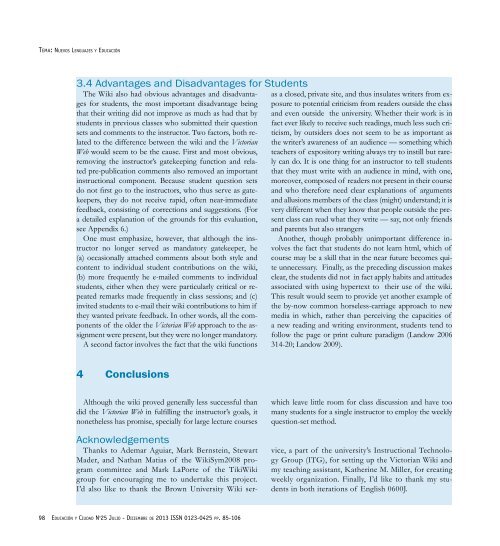Revista-Educación-y-Ciudad-No.-25
Revista-Educación-y-Ciudad-No.-25
Revista-Educación-y-Ciudad-No.-25
Create successful ePaper yourself
Turn your PDF publications into a flip-book with our unique Google optimized e-Paper software.
Tema: Nuevos Lenguajes y <strong>Educación</strong><br />
3.4 Advantages and Disadvantages for Students<br />
The Wiki also had obvious advantages and disadvantages<br />
for students, the most important disadvantage being<br />
that their writing did not improve as much as had that by<br />
students in previous classes who submitted their question<br />
sets and comments to the instructor. Two factors, both related<br />
to the difference between the wiki and the Victorian<br />
Web would seem to be the cause. First and most obvious,<br />
removing the instructor’s gatekeeping function and related<br />
pre-publication comments also removed an important<br />
instructional component. Because student question sets<br />
do not first go to the instructors, who thus serve as gatekeepers,<br />
they do not receive rapid, often near-immediate<br />
feedback, consisting of corrections and suggestions. (For<br />
a detailed explanation of the grounds for this evaluation,<br />
see Appendix 6.)<br />
One must emphasize, however, that although the instructor<br />
no longer served as mandatory gatekeeper, he<br />
(a) occasionally attached comments about both style and<br />
content to individual student contributions on the wiki,<br />
(b) more frequently he e-mailed comments to individual<br />
students, either when they were particularly critical or repeated<br />
remarks made frequently in class sessions; and (c)<br />
invited students to e-mail their wiki contributions to him if<br />
they wanted private feedback. In other words, all the components<br />
of the older the Victorian Web approach to the assignment<br />
were present, but they were no longer mandatory.<br />
A second factor involves the fact that the wiki functions<br />
as a closed, private site, and thus insulates writers from exposure<br />
to potential criticism from readers outside the class<br />
and even outside the university. Whether their work is in<br />
fact ever likely to receive such readings, much less such criticism,<br />
by outsiders does not seem to be as important as<br />
the writer’s awareness of an audience — something which<br />
teachers of expository writing always try to instill but rarely<br />
can do. It is one thing for an instructor to tell students<br />
that they must write with an audience in mind, with one,<br />
moreover, composed of readers not present in their course<br />
and who therefore need clear explanations of arguments<br />
and allusions members of the class (might) understand; it is<br />
very different when they know that people outside the present<br />
class can read what they write — say, not only friends<br />
and parents but also strangers<br />
Another, though probably unimportant difference involves<br />
the fact that students do not learn html, which of<br />
course may be a skill that in the near future becomes quite<br />
unnecessary. Finally, as the preceding discussion makes<br />
clear, the students did not in fact apply habits and attitudes<br />
associated with using hypertext to their use of the wiki.<br />
This result would seem to provide yet another example of<br />
the by-now common horseless-carriage approach to new<br />
media in which, rather than perceiving the capacities of<br />
a new reading and writing environment, students tend to<br />
follow the page or print culture paradigm (Landow 2006<br />
314-20; Landow 2009).<br />
4 Conclusions<br />
Although the wiki proved generally less successful than<br />
did the Victorian Web in fulfilling the instructor’s goals, it<br />
nonetheless has promise, specially for large lecture courses<br />
which leave little room for class discussion and have too<br />
many students for a single instructor to employ the weekly<br />
question-set method.<br />
Acknowledgements<br />
Thanks to Ademar Aguiar, Mark Bernstein, Stewart<br />
Mader, and Nathan Matias of the WikiSym2008 program<br />
committee and Mark LaPorte of the TikiWiki<br />
group for encouraging me to undertake this project.<br />
I’d also like to thank the Brown University Wiki service,<br />
a part of the university’s Instructional Technology<br />
Group (ITG), for setting up the Victorian Wiki and<br />
my teaching assistant, Katherine M. Miller, for creating<br />
weekly organization. Finally, I’d like to thank my students<br />
in both iterations of English 0600J.<br />
98 <strong>Educación</strong> y <strong>Ciudad</strong> N o <strong>25</strong> Julio - Diciembre de 2013 ISSN 0123-04<strong>25</strong> pp. 85-106


